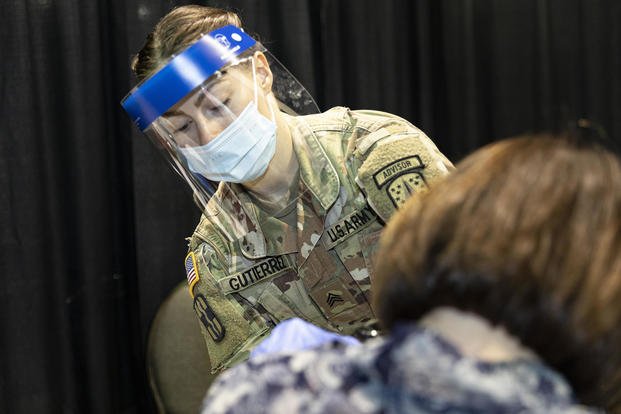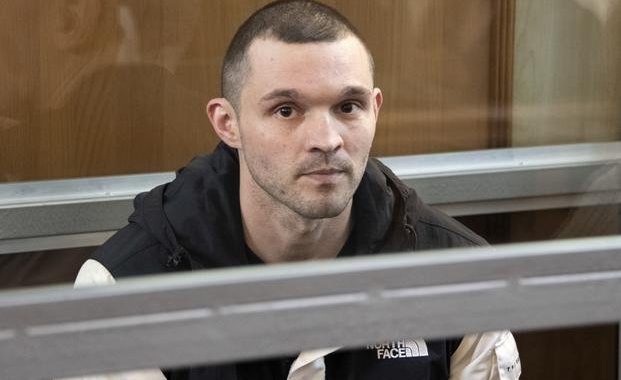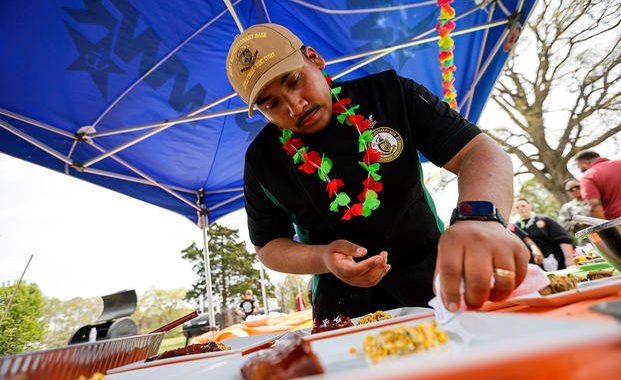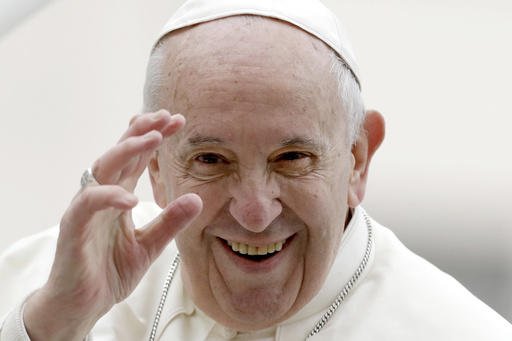The Army Keeps Booting COVID Vaccine Refusers as Shot Requirement May Be Dropped
4 min read
U.S. Army Sgt. Sofia Gutierrez, a combat medic assigned to 2nd Security Forces Assistance Brigade at Fort Bragg, North Carolina, administers a COVID vaccine to a patient at the Community Vaccination Center at the Wisconsin Center in Milwaukee.
The Pentagon’s COVID-19 vaccine mandate appears on the verge of being eliminated by Congress after just over a year, yet the Army — the only remaining service to never slow down separating troops who refuse inoculation — said Monday it will not pause those separations.
The Army has kicked out 1,841 active-duty soldiers for refusing inoculation, according to the latest service data released Friday. The Navy, Marine Corps and Air Force have halted or been barred by the courts from continuing separations, particularly for troops requesting religious exemptions, as legal fights play out over Defense Secretary Lloyd Austin’s August 2021 order that all service members be vaccinated.
Now, lawmakers might strike a deal to nix the vaccine mandate as part of the annual defense authorization bill after Republicans pushed for the repeal and the Marine Corps said vaccine disinformation in parts of the country is hurting recruiting. A vaccine mandate reversal could also set up an unprecedented legal fight with troops seeking compensation for their dismissal or fighting to be brought back into the ranks.
We will not speculate on any potential legislative actions, and continue to follow the policy of the Department of Defense and the United States Army to achieve a fully vaccinated force,” a service spokesperson told Military.com in a statement Monday.
The details of the massive defense bill were expected to be released Tuesday, and it was unclear whether the soldiers who were kicked out would be allowed to return to service or be provided compensation by Congress.
“Will the services be proactive? Will they reach out to those discharged and allow them to enlist or commission or will it be up to law firms to seek reenlistment or compensation?” William Hudson, a partner with Tully Rinckey, a firm specializing in military law, told Military.com. “The people I’ve talked to want to serve; they really wanted to stay in. I would hope those discharges will be allowed back in.”
On Saturday, Politico reported the Democratic chair of the House Armed Services Committee, Rep. Adam Smith of Washington state, put the mandate on the table in negotiations over the must-pass National Defense Authorization Act, or NDAA, which sets funding and policy priorities for the Defense Department.
Since the pandemic began, GOP lawmakers have attempted to stonewall efforts to combat the spread of infections or boost immunities and have used the Pentagon’s inoculation mandate as a partisan rallying cry.
However, Austin recommended on Sunday that the COVID-19 vaccine mandate stay in effect. Meanwhile, the White House has also opposed any repeal efforts, but signaled that the mandate is negotiable in the upcoming defense policy bill.
“With respect to NDAA, those discussions are ongoing,” White House Press Secretary Karine Jean-Pierre told reporters Monday.
Troops are required only to get the initial vaccination, not a booster shot. According to the Centers for Disease Control and Prevention, it’s unknown how long the vaccinations protect against the worst effects of COVID-19, though they’re estimated to remain effective for about a year, and many service members were vaccinated in early 2021.
For now, the Air Force, Navy and Marine Corps are in a holding pattern on removing troops due to court challenges. Some 1,200 Coast Guardsmenare part of a class-action lawsuit due to their religious exemptions being denied.
Troops are already required to maintain at least a dozen other vaccinations for ailments including the flu, hepatitis and smallpox. But COVID-19 was instantly politicized, and the vaccines embroiled in conspiracy theories and misinformation.
Army officials interviewed by Military.com have said that most religious exemption requests are spurred by disinformation about the vaccine and that if a soldier had no objections to previous vaccines, their request would likely face a swift rejection.
Roughly 1,000 soldiers sought a medical exemption, and 65 were approved across the active-duty force, National Guard and reserve.
Meanwhile, the Army National Guard has yet to suspend any of the 37,000 part-time troops who have not been vaccinated, though commanders are supposed to forbid unvaccinated Guardsmen from attending any training or deployments. Army Secretary Christine Wormuth has not issued guidance on separating Guardsmen since July, when that ban on training went into effect.
Guard officials interviewed by Military.com, including two adjutants general, say that sidelining those troops hit a major hurdle without clear guidance from Wormuth. While those troops will not be paid, they still take up space on a unit’s roster, meaning they potentially hold onto jobs and can make it harder for soldiers below them to be promoted.
Some have pointed to the Pentagon’s recent recruiting struggles as being partly attributable to the vaccine mandate, though virtually all evidence points more to widespread problems such as obesity, difficulty passing the military’s SAT-style entrance exam and tougher scrutiny of a candidate’s medical background.
“There was not accurate information out early on and it was very politicized, and people make decisions and they still have those same beliefs. That’s hard to work your way past, really hard to work,” Marine Corps Commandant Gen. David Berger told Military.com on Sunday.





